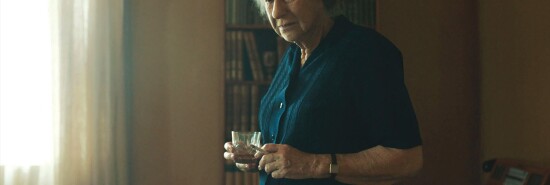
Helen Mirren plays Golda Meir in a new biopic about the Israeli prime minister
Sean Durns
A decade before the rise of U.K. Prime Minister Margaret Thatcher, Israel had its own “Iron Lady,” Golda Meir, a 75-year-old grandmother more famous for her chicken soup recipes than wielding weaponry yet who led the country through its biggest military challenge 50 years ago when Egyptian and Syrian forces invaded during the Yom Kippur holiday. And her life is now told on screen in Guy Nattiv’s new film Golda.
Helen Mirren stars as Meir, and Liev Schreiber portrays Henry Kissinger, the U.S. secretary of state often, but not always, at odds with the Israeli prime minister. This is by a wide margin the best portrayal of the Israeli premier put to film, easily surpassing Ingrid Bergman’s 1982 movie A Woman Called Golda, among others. The film is dark and somber. The cinematography is beautiful and bleak. The overall gritty feel is aided by sparse dialogue and a fitting score. And the mood is tense. This is a story of survival told from the perspective of a survivor who, while the Holocaust loomed, famously said, “There is only one thing I hope to see before I die, and that is that my people should not need expressions of sympathy anymore.”
THE ATOM SPLITS, THE GENDERS UNITE, AND THE BLOCK BUSTS
Mirren gives a superb performance. There are portions of the film in which old news clips are interspersed with Mirren’s Meir, and it can be hard to tell the difference. Mirren looks like Meir, her face etched with wary lines. She sounds like Meir. And she even walks like Meir, plodding but assured, holding a handbag. Schreiber gives a similarly strong performance as a taciturn Kissinger. He nails Kissinger’s famously gravelly voice and portrays the controversial secretary of state in an unadorned fashion.
Unsurprisingly, some of the film’s best moments come from tête-à-tête scenes between the two. In one of the movie’s memorable scenes, Meir and Kissinger engage in a battle of wills over the Israeli prime minister’s kitchen table, with Meir forcing the exhausted diplomat to eat borscht. The scene is one of many that hints at a core theme: Meir’s charm coexists with a steely determination.
Meir came from a working-class background and was part of Israel’s founding generation. On the eve of Israel’s 1948 War of Independence, she engaged in risky diplomatic missions, trying, unsuccessfully, to persuade Transjordan to refrain from attacking the fledgling Jewish state. She spent decades in the often fractious Israeli Labor Party, gaining a reputation as a canny political operator.
When Prime Minister Levi Eshkol suddenly died from a heart attack in 1969, Meir seemed to be a natural successor. She came to power amid a time of great change, both for the young nation and the Middle East. Israel had won a resounding victory in the 1967 Six-Day War, defeating numerous Arab opponents and seizing eastern Jerusalem and Judea and Samaria, or the West Bank, from Jordan and swaths of territory from Egypt and Syria.
But on Oct. 6, 1973, Israel was attacked on the Day of Atonement and caught flatfooted before regaining the offensive. The Jewish state would endure horrendous losses, in men and material, until it managed to beat Egypt and Syria back. Israel won the 1973 war, but it hardly felt victorious. How, it was rightly asked, could Israel have been surprised by massive invading armies bent on its destruction?
Recriminations would follow. The 1973 war, it could be said, marked the beginning of the end for the Labor Left that had ruled the country since its founding. Meir would soon retire. And her two immediate successors, Yitzhak Rabin and Shimon Peres, would rule only briefly before a conservative victory in 1977. Meir would die a year later — but not before she would watch Israeli Prime Minister Menachem Begin make peace with Egyptian leader Anwar Sadat, her old foe.
Golda’s story hinges on 1973. While concerned about Israel falling to Soviet client states such as Syria and Egypt, Kissinger is equally keen to prevent greater involvement from the Soviet Union in the region. And perhaps most importantly, he wants to move Sadat into the U.S. orbit. By contrast, Meir is solely focused on saving the country that she helped create and build. She has seen how little the outside world cares about Jewry, and she’s not interested in making compromises with possibly lethal results.
CLICK HERE TO READ MORE FROM THE WASHINGTON EXAMINER
In one of the film’s more memorable scenes, Meir coolly chastises Kissinger, reminding him that she was acutely aware of “the Russians,” having witnessed their pogroms as a little girl in her native Ukraine. But things are different now. The Jewish people have Israel and are no longer unarmed against those who seek their destruction. “I’m no longer that little girl hiding in the cellar,” she tells him.
Meir’s strength — some might say her stubbornness — is well captured in the movie, but so too is her vulnerability. The audience views her treatments for cancer, hidden at the time from Israelis, her incessant smoking, and the loneliness of command. Lives are being lost, and she knows she will have to account for all of them. Like Israel, Mirren’s Meir is both strong and vulnerable.
Sean Durns is a senior research analyst for the Committee for Accuracy in Middle East Reporting and Analysis.
